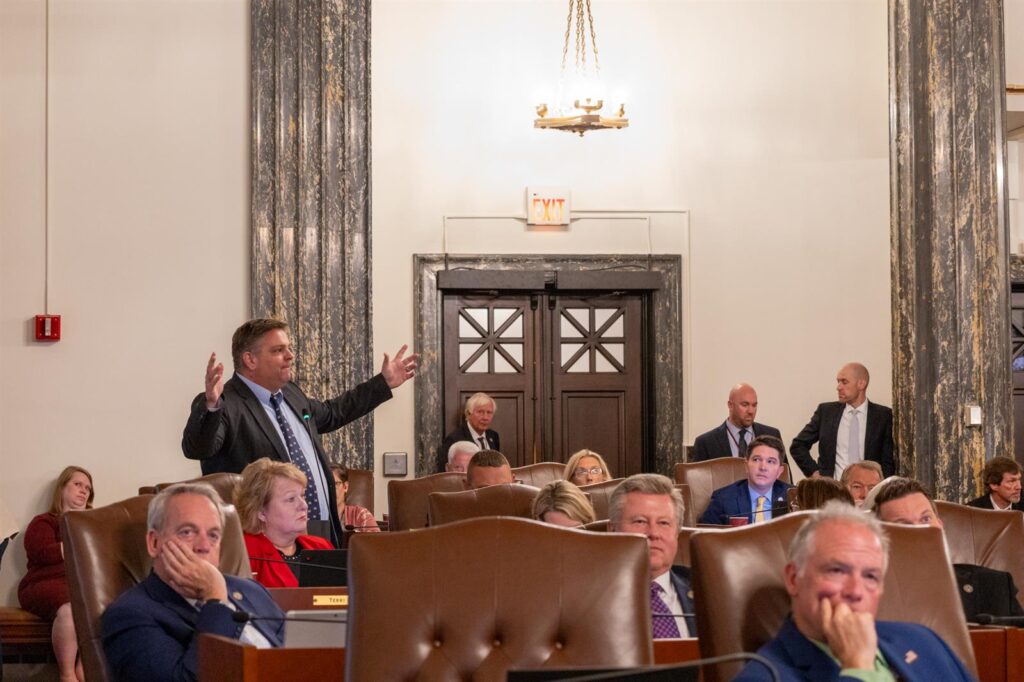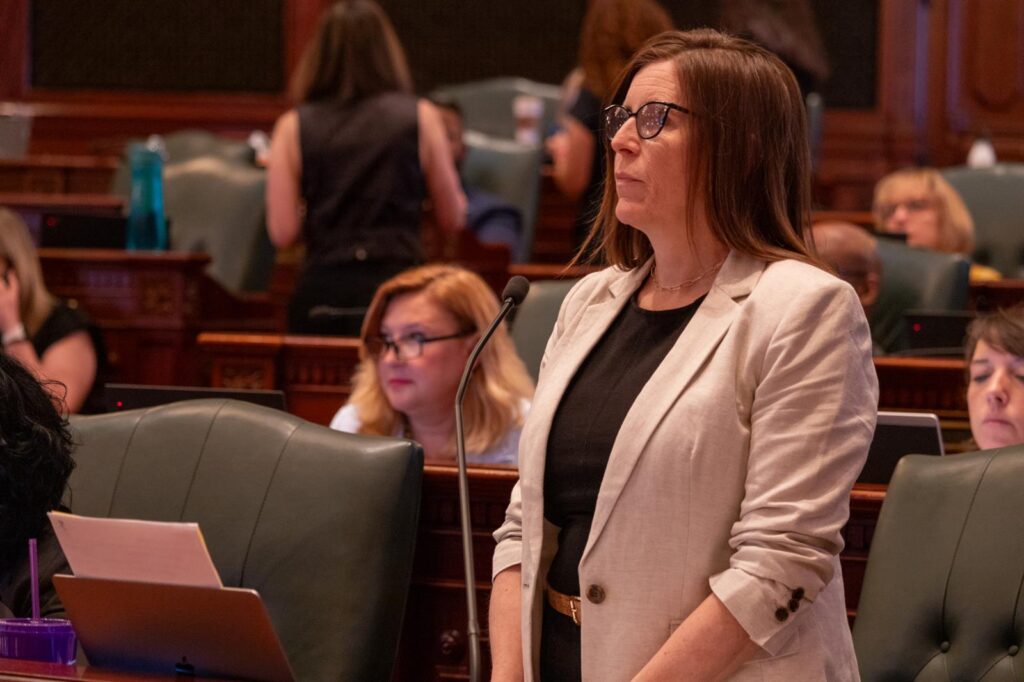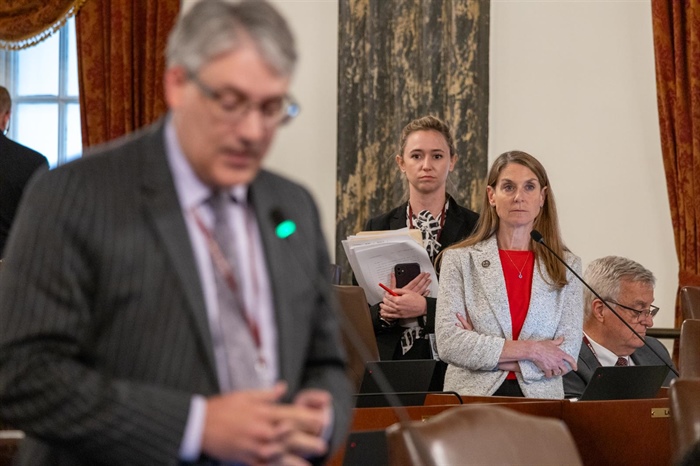Deal brokered by governor’s office also creates state funds for training first responders
SPRINGFIELD – After state regulators rebuffed several proposed carbon transport projects over the past year, lawmakers have moved to formally ban new projects until the federal government sets forth new safety rules.
The technology is used to take carbon dioxide – a powerful greenhouse gas – and move it through pipelines before storing it deep underground. While its proponents say it is key to addressing climate change, it is often criticized for the risks it brings with it, as a pipeline can burst, resulting in a flood of carbon dioxide for miles that can poison those caught in it.
The measure, part of a package regulating the developing technology, was the fruit of extended negotiations between lawmakers, environmentalists, business groups and the governor’s office among others.
Senate Bill 1289 passed the House 78-29 and the Senate 43-12, with two senators voting present. Gov. JB Pritzker said in a statement Sunday evening he plans to sign the bill into law.
The moratorium would expire on July 1, 2026, if the U.S. Pipeline and Hazardous Materials Safety Administration doesn’t finalize safety rules by then.
In addition, the bill has what proponents call some of the strongest carbon dioxide-related safety protections in the nation.
The bill requires monitoring of injection wells for at least 30 years after they close, a process that must be approved by the state and federal government. It also grants the Illinois Commerce Commission expanded authority to impose fees and require certain safety models to be used during permitting for carbon sequestration and transportation projects.
The fees would go into a group of newly created state funds that will help train first responders and provide equipment to manage potential emergency situations associated with carbon capture technology.
“No other state has this strong of a protection, long-term protections,” Sen. Laura Fine, D-Glenview, said during Senate debate of the bill.
Fine said in an interview after the bill passed that “the most fascinating part” about the legislation was its support from environmental groups.
Environmentalists have long fought against carbon sequestration projects. Juliana Pino, the policy director at the Little Village Environmental Justice Organization, said in a statement Sunday evening that these types of projects are “false solutions to the climate crisis and risk exacerbating the already disproportionate pollution burdens on our communities.”
But several environmental groups eventually supported the bill because the technology already exists and is in use in Illinois and more sequestration projects are likely to be proposed. They say the bill is a first in securing environmental and safety protections for these potential projects.
Pino and representatives of other groups, such as the Coalition to Stop CO2 Pipelines, the legal advocacy group Earthjustice and the Illinois Environmental Council, all applauded aspects of the bill, such as its safety requirements and language ensuring the projects do not increase pollution.

Other groups remained opposed after various levels of participation in negotiations over the past two years. Notably, the Illinois Farm Bureau, an interest group representing farmers and other large landowners, and the Illinois Soybean Association opposed the final bill, largely because of how it handles eminent domain.
Under the proposal, the state’s Department of Natural Resources can issue a binding order on “nonconsenting” landowners to force them to let carbon sequestration companies use their land – specifically, the “pore space” thousands of feet underground – to store carbon dioxide.
Companies would be required to give “just compensation” in exchange, but the method in the bill to calculate “just compensation” drew bipartisan criticism.
Sen. Michael Halpin, D-Rock Island, said the provision is “contrary to what the (U.S.) Constitution requires.”
Fine said she expects to revisit that language during negotiations over possible follow-up legislation this summer.
“We want to make sure every property owner is properly compensated,” she said.
Other lawmakers criticized the bill for not going far enough to protect the Mahomet Aquifer, which is the federally designated sole source of drinking water for much of central Illinois, including much of Champaign, Peoria and Rantoul.
In a December 2022 report commissioned by the General Assembly, the University of Illinois’ Prairie Research Institute noted “there is also the possibility that the carbonic acid could react with other minerals in rock formations in the aquifer and release other elements into the water.”
That report went on to suggest that sufficient testing and monitoring could mitigate some risk.
But the possibility of polluting the aquifer alarmed several lawmakers in both chambers, mostly those representing districts that draw water from the aquifer.

Sen. Chapin Rose, R-Mahomet, pointed to a 2016 methane leak from a natural gas injection well – a similar type of technology to carbon sequestration – that polluted drinking water in the Mahomet area.
“I don’t want to hear a damn thing about cleaning up the environment when these people can’t drink their water,” he said.
Fine said that while she initially pushed for specific protections for the aquifer, those were given up in exchange for industry groups’ support of more stringent monitoring requirements.
That monitoring – and remediation activities that would be paid for by companies – would result in limits to any potential adverse effects from a release of carbon dioxide.

“It would not be anything close to a catastrophic situation,” Rep. Ann Williams, D-Chicago, said during floor debate Saturday.
Rep. Carol Ammons, D-Urbana, represents an area that is served by the aquifer and voted in favor of the bill. She noted that she and other lawmakers would be watching the situation over the two years of the moratorium outlined in the bill “to see if there are additional protections that we need to make specifically for the Mahomet Aquifer.”
Capitol News Illinois is a nonprofit, nonpartisan news service covering state government. It is distributed to hundreds of print and broadcast outlets statewide. It is funded primarily by the Illinois Press Foundation and the Robert R. McCormick Foundation, along with major contributions from the Illinois Broadcasters Foundation and Southern Illinois Editorial Association.

